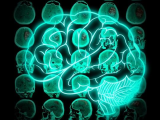Sep 24, 2010
Blood test tracking shows pandemic flu prevention measure benefits
In one of the first large-scale serologic studies to assess the effectiveness of public health measures during the 2009 H1N1 pandemic, a study of military units in Singapore found lower rates of infection in soldiers who were subject to more stringent disease-prevention measures. The observational study, in the Journal of Infectious Diseases, involved 1,015 soldiers from 14 units. Researchers studied serum samples and symptom questionnaires between Jun 22 and Oct 9, 2009. Soldiers were subject to three levels of protection—normal, essential, or healthcare worker—based on their job duties. The normal group was provided flu information and urged to seek medical care when sick. Additional prevention measures for the essential group included enhanced surveillance and segregation into smaller work groups. Healthcare workers wore N-95 respirators, gloves, and gowns during working hours. Serum evidence of H1N1 infection was lower in the essential and healthcare groups, at 17% and 11% respectively, compared with the normal group, which had a 44% seroconversion rate. The authors concluded that their findings show the benefit of flu-prevention measures, which they say could especially be important for countries with scarce flu vaccine.
Sep 23 J Infect Dis abstract
Children with pandemic H1N1 had increased neurologic conditions
A new study in Annals of Neurology determined that 2009 pandemic H1N1 influenza was associated with more cases of encephalopathy and other neurologic conditions in children than was season flu. Researchers from the University of Utah studied 303 patients from their medical center who had confirmed novel H1N1, 18 of whom had neurologic complications, and 234 children hospitalized with seasonal flu, 16 of whom had neurologic manifestations. They determined that seizures were the most common neurologic complication in both groups, and that encephalopathy, focal neurologic findings, and aphasia were significantly more common in the pandemic group. Also, 66% of the pandemic group had underlying neurologic conditions, compared with only 25% of the seasonal-flu group. They also found that focal neurologic symptoms persisted in 4 (22%) of the 18 pandemic H1N1 patients at discharge, compared with none in the seasonal-flu patients. "The absence of proven treatments for influenza-related neurological complications underlines the importance of vaccination," said Joshua Bonkowsky MD, PhD, one of the study's authors.
Sep 23 Ann Neurol study
Sep 20 press release on the study
Study finds flu data comparisons helps define severity
In an effort to better detect spikes in flu severity, Dutch researchers reported success in comparing hospital and mortality data with general surveillance for flulike illness at physicians' offices. To gauge the presence of heightened severity in the Netherlands between 1999 and 2005, they looked for flu-related hospitalization increases that were disproportionate to the number of cases reported by general physicians. They used virus isolation and characterization data when they interpreted their results. When they used the method to look at severity for all the flu seasons during the study period, they found a disproportionate severity increase in 2003 through 2004 that coincided with the circulation of a drifted influenza A (H3N2) Fujian strain. They wrote that the novel approach could help complement traditional methods of tracking increases in seasonal and pandemic flu.
Sep 23 Am J Public Health abstract
Senate food safety agreement still stalled
Senate Democrats, headed by Dick Durbin (Ill.) yesterday tried to move the food safety reform bill again yesterday by unanimous consent with the addition of a compromise amendment, but Sen Tom Coburn (R-Okla.) again rejected the bid, saying it didn't address his concerns that the legislation's costs are fully offset, Politico reported. The Congressional Budget Office has already stated that the bill is pay-as-you-go compliant. Coburn pressed Democrats to end debate on the bill by taking a cloture vote. However, Politico reported that it's not clear if Democrats have the 60 votes needed for cloture. The report said the tight legislative calendar may push further consideration of the bill past the November elections and quoted a spokeswoman for majority leader Sen Harry Reid (D-Nev.) as saying the bill could still move forward this year.
Sep 23 Politico story
Bahamas sounds dengue warning
Public health officials in the Bahamas yesterday issued a public health advisory about an increase in dengue disease activity in the Caribbean region, including the Bahamas. The Bahamas Department of Public Health reported that so far it has confirmed fives cases, and 20 more suspected infections are under investigation, the Bahamas Weekly, an online news service, reported yesterday. It said authorities are working closely with the Department of Environmental Health Services to prevent and control the spread of the disease. Meanwhile, another Bahamas news outlet reported a dengue death. The Bahamas Press reported that the fatality involved a mother of three in her late twenties who had recently graduated from college and returned to Nassau to practice medicine.
Sep 23 Bahamas Weekly report
Sep 23 Bahamas Press story


















